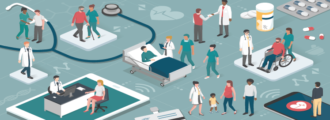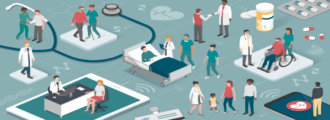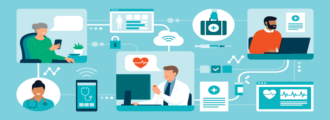There’s no question that the COVID-19 pandemic has exposed many weaknesses in the American healthcare industry, especially when it comes to healthcare interoperability. Specifically, the latest report from research firm KLAS found that healthcare organizations’ biggest technology challenges during the pandemic have been telehealth, remote patient monitoring, interoperability, and real-time data analytics.
What’s even more concerning, however, is that the authors of the report said, “While healthcare organizations have found stopgaps in many areas, few have successfully implemented permanent solutions that serve a long-term strategy.”
Let’s take a closer look at what specifically the healthcare industry is struggling with, technology-wise, and how focusing on healthcare interoperability in particular will help solve some of their issues.
Healthcare’s Biggest Challenges (and Opportunities)
If you look deeper into the data, you’ll see significant struggles with interoperability and real-time data analytics.
When asked if their organization has solved these technology challenges, 22 percent of healthcare executives said interoperability was unsolved, and 17 percent said it was in the process of being solved. And when it comes to real-time data analytics, the numbers are even further behind. Only 37 percent of executives have solved their analytics problems, with the remaining 63 percent either unsolved or working on it.
Next, the report dives into which technologies the organizations implemented or focused on the most due to the COVID-19 crisis. Only 17 percent of the respondents implemented or enhanced their interoperability and only 11 percent implemented real-time data analytics.
Why Interoperability Is So Important
While COVID-19 has illuminated the healthcare industry’s struggles with interoperability, tackling the challenges of the pandemic has also illustrated the necessity of improving things, especially when it comes to interoperability. Here are three specific ways in which focusing on healthcare interoperability (as well as real-time analytics) will help organizations become more efficient and deliver better care to their patients.
Deliver Better Patient Care
A fully interoperable ecosystem of all patient information would be invaluable for medical professionals, departments of public health, and researchers working to locate high-risk patients and possible treatments. Imagine if every doctor in every clinic or hospital had access to a comprehensive suite of patient data whenever they interacted with a patient. How much more accurate, educated, and fast would their decisions become? On the other side of the table, payers would also be able to use that same data to make better decisions about pre-approvals, reimbursements, and claims.
Improve Public Health
Beyond general health benefits, truly interoperable data (combined with real-time analytics) would also offer dividends when it comes to improving public health, during the current pandemic and afterward. We’ve already witnessed the elderly and those with preexisting conditions suffer the most from COVID-19, but we’ve also learned that people with specific social factors are also at much higher risk. That type of demographic and social data isn’t typically available in most EHR or claims data, however, which makes it more challenging for those doctors to deliver the best care possible to those people. If doctors were able to access that information, however, we could better identify people in at-risk groups and deliver programs to help educate them of their risks—and potentially save more lives.
Track the Spread
Another benefit of leveraging interoperable data and analytics is tracking infection spread, even with a lack of COVID-19 tests. There’s already some evidence to suggest that analyzing claims data to reveal anomalies in the correlation between flu testing and flu diagnosis can help predict regional surges in COVID-19 cases. This information could help public health organizations and governments make educated decisions about social distancing measures and reopening.
The Future of Healthcare Interoperability
Much of the information the healthcare industry gleans from this pandemic will help improve the future of healthcare overall, and interoperability mandates have been long overdue. If there’s one thing we can take away from COVID-19, it’s that change needs to happen.
And the healthcare interoperability consulting team here at Surety Systems is here to help. We have experience with a wide variety of HL7 engines, so no matter what integration engine you use, we’ve got your back. We’ve been helping companies overcome their interoperability challenges long before the pandemic, and we’re committed to helping organizations solve these challenges long after the crisis is over.
Contact us today to learn how we can help you fix your healthcare interoperability issues.




